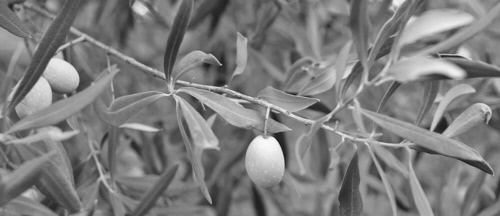After having met Franca Maria Serra outside the block of flats in which she lives with her family, we went upstairs to their combined apartment and office. She inherited a property with almond trees from her mother and after having graduated in agriculture at the University of Sassari, she started expanding the property by buying adjacent properties to the one she had inherited. Finally, the almond trees were uprooted and replaced by olive trees.
During our interview with Franca Maria, she proudly showed us the awards her company had won in many competitions, but the most important one was “il Premio Biol” which was an award for making the best organic olive oil in the world.
After the interview, we were invited to their property near Villacidro where rows of olive trees called Nera di Villacidro and Nera di Gonnosfanadiga are grown in an organic way. Since we arrived in the beginning of October and the harvest had just begun, we were able to see both kinds of olives they are cultivating. Franca Maria explained to us that by starting the harvest so early the performance of the olives will be inferior to one made in January or February, but the quality is better because when the olives are green, they contain a high quantity of polyphenols, that is natural antioxidants conserving the olive oil better over time and they are very important for the health of man. In short, an early harvest gives olives with more antioxidants and olive oil of the highest quality. In addition, as this article shows, olive oil is very useful in combating different types of cancers of the body.
We also saw rubber tubes, extending along each line of olive trees, in order to irrigate the trees with water drops and the traps for capturing parasites before they deposit eggs inside the olives. The traps are allowed in organic farming and have been developed by professors of entomology at the University of Sassari. As a matter of fact, organic cultivation of olive trees and production of organic extra virgin olive oil by this business is guaranteed by the Italian Association of Organic Agriculture, and controlled by the Environmental and Ethical Certification Institute .
Before the harvest, the ground is covered with a net and a vibrating mechanical harvester is used to make the Nera di Villacidro olives fall to the ground. Instead, the Nera di Gonnosfanadiga olives are picked manually one by one such that will not be subjected to any damage because they will be served with their skins intact after their bitterness has been removed. This is done by putting the olives in containers containing water and a certain amount of salt, then everything is left untouched for 10 months. In this way, the olives lose their bitterness in a natural manner because the salt water together with the olives will form yeast which will gradually decrease the bitterness of the olives. In fact, increasing the time the olives are kept in the salt water will make them less bitter and they can be kept like that for up to 2 years.
This company doesn’t have its own olive press and sometimes they have had to wait for making olive oil. Instead, this year they have made an agreement with the owner of the olive press such that the waiting time should be as short as possible, the olives will enter the olive press within half an hour after arrival, which will impede leavening of the olives, ensuring a high quality of the finished product.
The olive oil is poured into stainless steel containers of 50 litres before it is transported straight from the olive press to the storeroom in the cellar of the block of flats where the Serra family lives. There, the oil is poured into containers of 300, 1000 and 1500 litres where they are stored for from one month to a month and a half. During this time, particles in the olive oil are allowed to settle and by pouring out the contents of the containers twice and letting the heaviest part of the oil stay, a large amount of particles will be removed because no filtering is used. Then, the olive oil is ready to be sold.
They are only producing extra virgin olive oil, which is sold in bottles of 100, 250 and 500 ml to restaurants, while clients, who buy directly from the company, use bottles of 3 and 5 litres. The olive oil is also sold in continental Italy and exported to Germany.

